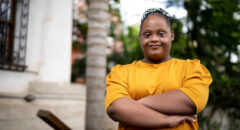
Down syndrome is a genetic condition that affects individuals in unique ways. Understanding the different types can help foster a more inclusive and supportive environment for you or your loved one with Down syndrome. Let’s delve into the three main types: Trisomy 21, Mosaic Down syndrome, and Translocation Down syndrome.
What is Down Syndrome?
Down syndrome, also known as Trisomy 21, is a genetic condition caused by the presence of an extra copy of chromosome 21. Chromosomes are structures in cells that carry genes, which are the instructions for how our bodies develop and function. Typically, each person has 46 chromosomes, with 23 pairs inherited from each parent. However, individuals with Down syndrome have an extra copy of chromosome 21, resulting in a total of 47 chromosomes.
1. Trisomy 21
This is the most common type, accounting for about 95 percent of cases. It occurs when each cell in the body has three copies of chromosome 21 instead of the usual two, usually due to an error during the formation of reproductive cells (eggs or sperm). Here are some key tips:
Early Intervention is Key: Start intervention services early, such as speech therapy and occupational therapy, to address developmental delays and enhance overall well-being.
Emphasize Individual Strengths: Celebrate and encourage individual strengths and talents. Trisomy 21 presents a spectrum of abilities, and recognizing and nurturing these strengths can contribute to a person’s sense of identity and confidence.
Establish Routine and Structure: Individuals with Trisomy 21 often benefit from routines and predictability. Establishing a structured environment can help manage daily activities and reduce anxiety.
RELATED:
2. Mosaic Down Syndrome
In this type, only some cells in the body have an extra copy of chromosome 21, while others have the typical two copies. This occurs when errors in cell division happen after fertilization. Consider the following tips:
Tailored Support: Recognize that individuals with Mosaic Down syndrome may have a broad range of abilities and challenges. Tailor support and interventions to address their specific needs and strengths.
Regular Monitoring: Periodic assessments and check-ins with healthcare professionals can help monitor changes in development and adjust support accordingly.
Promote Inclusion: Encourage inclusive environments that foster social interactions and friendships. Mosaic Down syndrome may not








